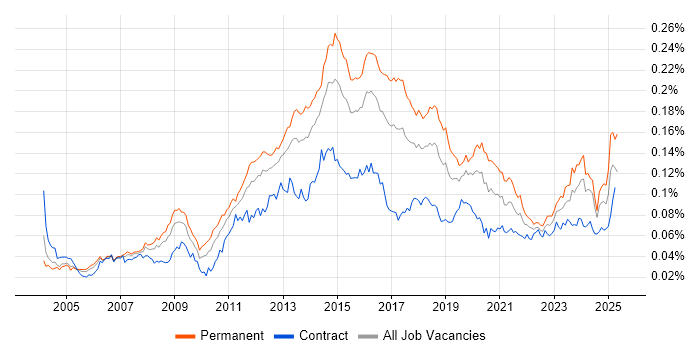Infrastructure Support Engineer
UK
The median Infrastructure Support Engineer salary in the UK is £42,000 per year, according to job vacancies posted during the 6 months leading to 21 May 2025.
The table below provides salary benchmarking and summary statistics, comparing them to the same period in the previous two years.
| 6 months to 21 May 2025 |
Same period 2024 | Same period 2023 | |
|---|---|---|---|
| Rank | 632 | 744 | 889 |
| Rank change year-on-year | +112 | +145 | +220 |
| Permanent jobs requiring an Infrastructure Support Engineer | 86 | 140 | 87 |
| As % of all permanent jobs advertised in the UK | 0.15% | 0.14% | 0.087% |
| As % of the Job Titles category | 0.17% | 0.15% | 0.096% |
| Number of salaries quoted | 74 | 125 | 83 |
| 10th Percentile | £32,500 | £30,154 | £35,400 |
| 25th Percentile | £37,500 | £36,250 | £36,250 |
| Median annual salary (50th Percentile) | £42,000 | £46,500 | £45,000 |
| Median % change year-on-year | -9.68% | +3.33% | -2.70% |
| 75th Percentile | £53,000 | £52,500 | £54,000 |
| 90th Percentile | £58,750 | £64,500 | £60,000 |
| UK excluding London median annual salary | £40,000 | £46,500 | £41,250 |
| % change year-on-year | -13.98% | +12.73% | -0.30% |
All Permanent IT Job Vacancies
UK
For comparison with the information above, the following table provides summary statistics for all permanent IT job vacancies. Most job vacancies include a discernible job title that can be normalized. As such, the figures in the second row provide an indication of the number of permanent jobs in our overall sample.
| Permanent vacancies in the UK with a recognized job title | 50,627 | 94,635 | 91,055 |
| % of permanent jobs with a recognized job title | 90.61% | 94.71% | 91.54% |
| Number of salaries quoted | 26,942 | 67,569 | 57,579 |
| 10th Percentile | £29,444 | £28,500 | £32,500 |
| 25th Percentile | £41,250 | £38,500 | £45,000 |
| Median annual salary (50th Percentile) | £55,000 | £52,500 | £60,000 |
| Median % change year-on-year | +4.76% | -12.50% | - |
| 75th Percentile | £73,750 | £70,750 | £80,000 |
| 90th Percentile | £95,000 | £90,000 | £100,000 |
| UK excluding London median annual salary | £51,564 | £50,000 | £53,000 |
| % change year-on-year | +3.13% | -5.66% | +6.00% |
Infrastructure Support Engineer
Job Vacancy Trend
Job postings that featured Infrastructure Support Engineer in the job title as a proportion of all IT jobs advertised.

Infrastructure Support Engineer
Salary Trend
3-month moving average salary quoted in jobs citing Infrastructure Support Engineer.
Infrastructure Support Engineer
Salary Histogram
Salary distribution for jobs citing Infrastructure Support Engineer over the 6 months to 21 May 2025.
Infrastructure Support Engineer
Top 11 Job Locations
The table below looks at the demand and provides a guide to the median salaries quoted in IT jobs citing Infrastructure Support Engineer within the UK over the 6 months to 21 May 2025. The 'Rank Change' column provides an indication of the change in demand within each location based on the same 6 month period last year.
| Location | Rank Change on Same Period Last Year |
Matching Permanent IT Job Ads |
Median Salary Past 6 Months |
Median Salary % Change on Same Period Last Year |
Live Jobs |
|---|---|---|---|---|---|
| England | +115 | 85 | £41,500 | -10.75% | 17 |
| UK excluding London | +143 | 77 | £40,000 | -13.98% | 14 |
| South East | +71 | 39 | £42,000 | -9.68% | 5 |
| Work from Home | +78 | 20 | £42,500 | -12.37% | 2 |
| North of England | +56 | 19 | £47,250 | +45.38% | |
| West Midlands | +64 | 17 | £35,000 | -6.67% | 4 |
| Midlands | +62 | 17 | £35,000 | -22.22% | 5 |
| North West | +13 | 17 | £52,000 | +39.60% | |
| London | +103 | 8 | £49,000 | -27.41% | 3 |
| Yorkshire | +64 | 2 | £40,000 | +23.08% | |
| East of England | +43 | 2 | £47,500 | -5.00% | 1 |
Infrastructure Support Engineer Skill Set
Top 30 Co-occurring Skills and Capabilities
For the 6 months to 21 May 2025, Infrastructure Support Engineer job roles required the following skills and capabilities in order of popularity. The figures indicate the absolute number co-occurrences and as a proportion of all permanent job ads featuring Infrastructure Support Engineer in the job title.
|
|
Infrastructure Support Engineer Skill Set
Co-occurring Skills and Capabilities by Category
The follow tables expand on the table above by listing co-occurrences grouped by category. The same employment type, locality and period is covered with up to 20 co-occurrences shown in each of the following categories:
|
|
||||||||||||||||||||||||||||||||||||||||||||||||||||||||||||||||||||||||||||||||||||||||||||||||||||||
|
|
||||||||||||||||||||||||||||||||||||||||||||||||||||||||||||||||||||||||||||||||||||||||||||||||||||||
|
|
||||||||||||||||||||||||||||||||||||||||||||||||||||||||||||||||||||||||||||||||||||||||||||||||||||||
|
|
||||||||||||||||||||||||||||||||||||||||||||||||||||||||||||||||||||||||||||||||||||||||||||||||||||||
|
|
||||||||||||||||||||||||||||||||||||||||||||||||||||||||||||||||||||||||||||||||||||||||||||||||||||||
|
|
||||||||||||||||||||||||||||||||||||||||||||||||||||||||||||||||||||||||||||||||||||||||||||||||||||||
|
|
||||||||||||||||||||||||||||||||||||||||||||||||||||||||||||||||||||||||||||||||||||||||||||||||||||||
|
|
||||||||||||||||||||||||||||||||||||||||||||||||||||||||||||||||||||||||||||||||||||||||||||||||||||||
